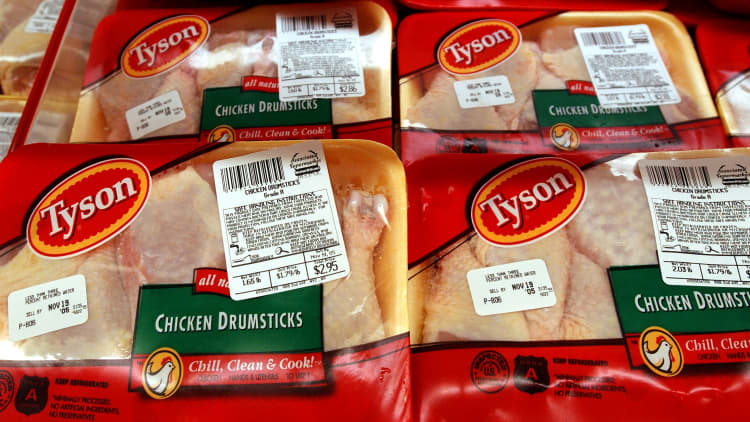Despite the buzz around plant-based alternatives and vegan recipes, Americans still love meat.
Americans typically consumed more than 180 pounds of beef, pork and poultry in 2018, 10% more than in 1970. Plant-based meat retail sales were $760 million last year — a fraction of total meat and poultry sales. Whether it's at your favorite fast-food restaurant or in the grocery aisle, one company that carnivores turn to again and again is Tyson Foods.
Tyson Foods is one of the world's largest food companies, producing about 20% of the beef, pork and chicken in the U.S. It services restaurants and schools and sells brands like Jimmy Dean and Sara Lee in supermarkets.
In the spring, the 85-year-old food giant faced the perfect storm — higher production costs, lower levels of productivity and softer demand. Restaurants were closed as governments enforced social distancing rules. And in April, thousands of Tyson workers were infected with the coronavirus at processing plants. Facilities were forced to shut down, and meat shortages sprang up at grocery stores across the country.
"We've implemented a wide variety of measures to look after our workers, from measuring temperatures as they come through the door, face coverings, staggered breaks, expanded room and social distancing," said Stewart Glendinning, CFO of Tyson Foods. "All of these are designed to help keep our workers safe. Keeping our workers safe is what will keep our plants running."
In August 2020 Tyson reported fiscal third-quarter profits declined 22% from a year earlier. Amid falling sales, CEO Noel White stepped down as CEO and the company tapped Dean Banks, its president, as his successor. White remains with Tyson in the newly created role of executive vice chairman. Banks previously worked in Google-parent Alphabet's experimental research division and has a background in health-care technology.
But analysts argue that after decades of industry consolidation, some of Tyson's problems may have been self-inflicted.
"Covid-19 has exposed weaknesses in the meat system that people have been talking about for years but that have never been exposed as they were now," said Christopher Leonard, author of "The Meat Racket." "Essentially what Covid-19 showed was the profound fragility that happens when you move all of your production into as few slaughterhouses as possible."
CNBC reached out to Tyson Foods but the company did not respond to our request for an interview.
Can one of America's biggest meat suppliers recover from the devastating blows of the Covid-19 crisis, opening an opportunity for rivals JBS, Cargill and Smithfield Foods? Watch this video to find out more.



